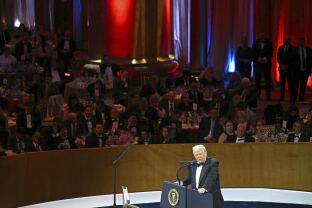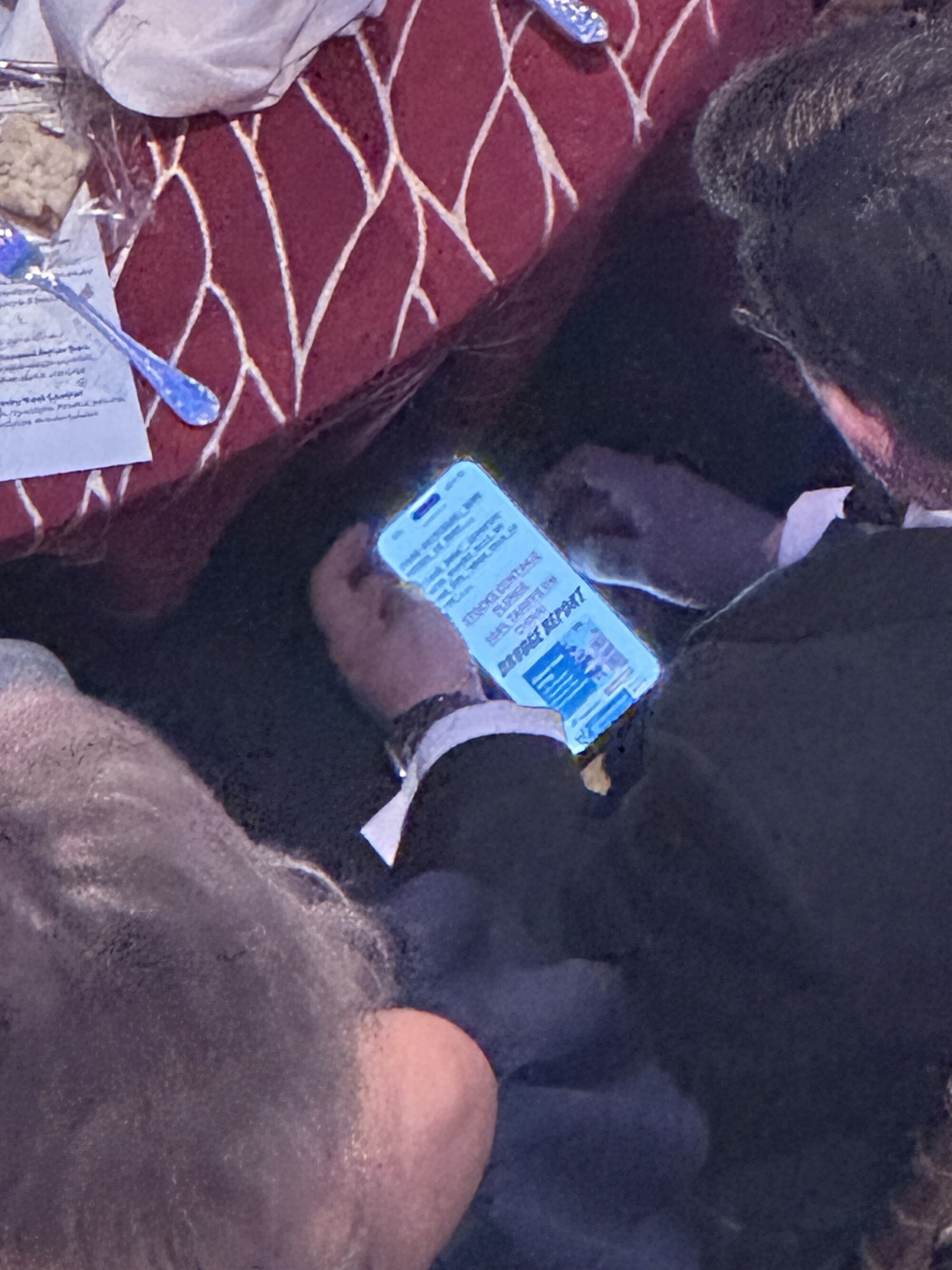In the hours before the U.S.’s global tariffs took effect, President Donald Trump was boasting to a room of lawmakers, allies and donors at a House Republican fundraising dinner. Speaker Mike Johnson was sitting at a table near the stage, checking the Drudge Report.
Splashed across his phone screen were the words, “Stocks Continue Plunge,” NOTUS spotted.
The room at the National Republican Congressional Committee fundraiser was “upbeat” and “high energy,” one source told NOTUS. Rep. Richard Hudson, the committee’s chair, announced it raised $35.2 million, a sum Trump proclaimed “broke every record.”
But there was an elephant in the room: the roiling unease among some members of his party — and major donors — regarding the tariffs on the eve of their implementation.
The markets fell sharply over the three trading sessions since Trump announced a laundry list of tariffs on dozens of countries and trading blocs, putting a sizable dent in the collective wealth of some of his biggest financial backers. Some notable donors have openly questioned the president’s strategy, and a Republican strategist familiar with the party’s big donors said they were aware of one major contributor who temporarily suspended all political giving because of the economic uncertainty related to the tariffs.
Other longtime donors could do the same if economic conditions don’t improve, warned the source, who requested anonymity to discuss sensitive fundraising issues.
“It wouldn’t surprise me if a lot of them are reevaluating where things are at the moment,” the strategist said. “And it’s early off in the cycle that they can do that without any real repercussions.”
Major donors are always critical sources of funding for both parties. But Republicans might be especially dependent on their support in next year’s midterms if the party’s years-long struggles with small-dollar donations continues and Democrats keep channeling anti-Trump fervor into campaign contributions. Already this year, House GOP candidates were badly outraised in a pair of special elections, and most party strategists expected — even before the onset of the tariffs — that they would be at a financial disadvantage next November.
“It’s a midterm. Fundraising was always going to be tricky,” said one GOP strategist who requested anonymity to speak candidly. “And now you’re taking that baseline difficulty and compounding it with the tariffs.”
The strategist and other party operatives emphasized that both the election cycle and Trump’s fight over tariffs are in the very early stages, meaning any full-blown panic over big donor defections is premature. Many of them also said that even if they are more nervous than they’d like to be, they’re confident the party’s top contributors will eventually kick in to next year’s campaigns.
But the party has little room for error: Republicans hold slim majorities in Congress, especially in the House. The GOP has a more comfortable but still narrow edge in the Senate, where it holds a three-seat majority.
Democrats have already aggressively targeted GOP lawmakers in both legislative bodies ahead of the midterm elections, arguing that Trump’s tariffs will hurt the economy.
It’s a point Republican donors have also raised in recent days.
Joe Lonsdale, the billionaire co-founder of the military tech company Palantir, took to X to express some concerns “about how the tariffs could be done better.” Lonsdale, who created with Elon Musk the pro-Republican spending machine America PAC, said he raised concerns “a few days ago to friends in this administration; hope they fix it.”
“Let’s not tariff any inputs we can’t easily substitute. Time to fix some of the nuance immediately,” Lonsdale wrote in a separate post, although he said he thought Trump was “right” about the “unfair rules” many countries have.
Hedge fund billionaire Bill Ackman went on a social media screed Monday, warning of an “economic nuclear winter.”
“I have a lot of respect for our president and what he has accomplished so far, but I don’t think he is infallible, which is why I am stating loud and clear that I strongly believe launching tariffs on April 9th against the entire world — massively in excess of what we are being charged — is a mistake,” Ackman wrote in one post.
Though Ackman said Tuesday that some “misinterpreted my thoughts on tariffs,” he pressed for a pause so deals could be made “without a major global economic disruption that will harm the most vulnerable companies and citizens of our country.”
The Home Depot co-founder Ken Langone, a long-time top GOP donor, also expressed frustration with Trump’s tariffs, a feeling party operatives say is widely shared within the party’s donor class.
“I’m not aware of any who are enthusiastic about the tariffs,” said the Republican strategist who regularly talks with donors. “I think there are varying degrees to which they view this as a negotiation and they want to play out a little bit more.”
Traditionally, big donors — most of whom made their fortune in the private sector — have allied with the GOP due to their support for lower taxes, lower government regulation and other free market principles. Raising tariffs, a measure embraced by the party’s Trump-led populist wing, cuts directly against that agenda.
But some Republican strategists, while not dismissive of concerns about big donors, said there is time for big donors to rejoin the fold before next year’s election. Even if many of them are expressing frustration now, they add, few have gone as far to declare that they will stop donating to GOP congressional candidates.
“I don’t think anyone likes seeing the market tank as much as it has,” said a senior GOP strategist who requested anonymity to speak candidly. “So if they were having to write checks today, that would be a problem. Whether that would be a problem for writing checks a year and some change from now, that’s totally dependent on what the actual reality is at the time.”
Trump showed no signs of backing down from his current strategy. In fact, he teased a new forthcoming tariff targeting the pharmaceutical industry.
“We’re gonna be announcing very shortly a major tariff on pharmaceuticals, and when they hear that, they will leave China, they will leave other places, because they have to sell, most of their product is sold here, and they’re gonna be opening up their plants all over the place in our country,” said Trump.
The room, which had been raucous during most of Trump’s speech, reacted with little applause.
—
Alex Roarty and Taylor Giorno are reporters at NOTUS. Jasmine Wright and Reese Gorman, reporters at NOTUS, contributed to this report.
Sign in
Log into your free account with your email. Don’t have one?
Check your email for a one-time code.
We sent a 4-digit code to . Enter the pin to confirm your account.
New code will be available in 1:00
Let’s try this again.
We encountered an error with the passcode sent to . Please reenter your email.



